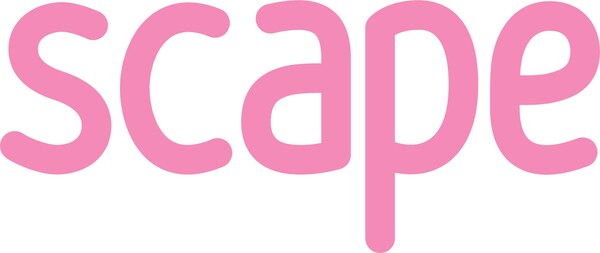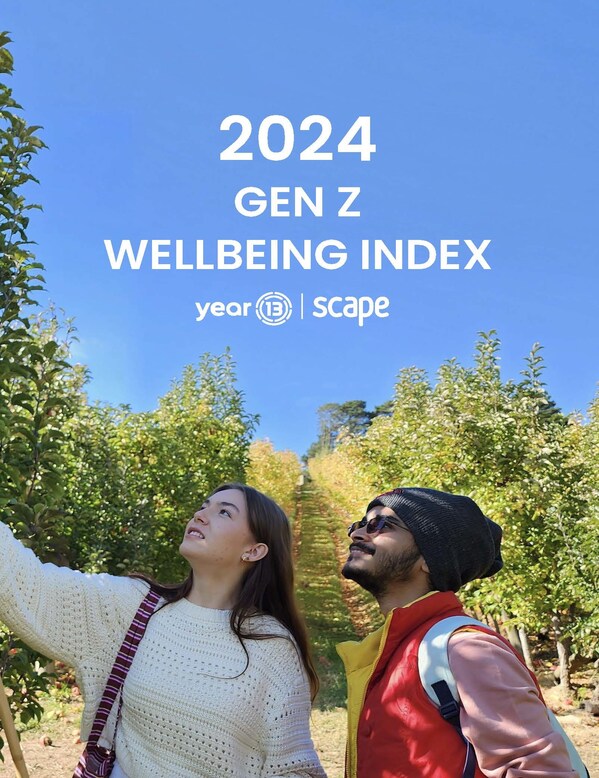GEN Z TAKING PROACTIVE STEPS TO ADDRESS MENTAL HEALTH ISSUES
By PRNEWSWIREPublished : July 8, 2024 - 21:00

Yet youth body confidence, ADHD and general lack of purpose abound according to new research
SYDNEY, July 8, 2024 /PRNewswire/ -- More than half of Gen Zs are increasingly seeking out mental health therapy indicating support is needed for an entire generation of Australians plagued by anxiety and depression, according to a national youth wellbeing study conducted by digital youth engagement platform Year13, in partnership with Scape, Australia's largest owner and operator of purpose-built student accommodation (PBSA). The new research also revealed increasing rates of body dysmorphia (21%) and ADHD (27%) amongst Australian youth, and their disillusionment about the future in general, with 65% stating they had no purpose. Positively however it found that overall, 53% of young adults aged 18-24 years have had mental health therapy, showing they are taking proactive steps to address their mental wellbeing.
Undertaken in May 2024, the 2024 Gen Z Wellbeing Index, explores the mental health, exercise, sleep and diet patterns of more than 2,000 young Australians and 1,000 Scape residents aged between 18 to 24 - representing the youth demographic who have finished school and tracking progress made since its launch in 2023. The results in the report allow Scape to compare the wellbeing of its student residents with the wellbeing of young people nationally, who each took the same wellbeing survey at the same time, with the results showing that young people staying with Scape are doing better on average than young Australians in general.
The 2024 study revealed that more than two thirds of young Australians say they don't get enough sleep (69%), more than half say they suffer from anxiety (56%), two in five say they are struggling to make friends (40%), and a third are feeling lonely (35%), and overall, almost half cite their mental health as only fair or poor (43%).
The research also found about two thirds of young Australians say they don't spend enough time outdoors (67%), that they don't eat enough healthy food (64%), and that they are not physically active enough (61%). About half of young people also say they don't connect enough with friends (49%) or with family (46%).
The top negative influences on youth wellbeing in 2024 have also been found with more than half of young Australians saying figuring out their future (56%), fatigue/energy levels (56%), the rising cost of living (53%) and burnout (51%) are negatively impacting their wellbeing.
Two fifths of young Australians also revealed they are suffering from low self-esteem (43%), poor body image (41%), and social anxiety (40%), while more than a third say they are suffering depression (35%).
And when it comes to the big issues of concern for today, more than half of young people say violence against women (53%) is an issue of concern for them, making it the third biggest issue Gen Zs are worried about after cost of living (77%) and housing/rental affordability (63%), and above climate change (49%).
Commenting on the findings, Year13 Co-Founder, Will Stubley said: "Understanding the most pressing challenges of young Australian's underpins our capability as a nation to provide real and meaningful support to young people. What's clear is we have a whole generation that needs ongoing wellbeing support and help with actionable wellbeing strategies and resilience building in order for them to live healthy happy lives."
"Our yearly measure of youth wellbeing can help to provide insights into their challenges and successes to highlight key areas of concern that need to be addressed so we can improve the overall health and wellbeing of young Australians and Australia as a whole," he added.
Underpinning the benefits of purpose-built student accommodation, the 2024 Gen Z Wellbeing Index results were markedly more positive for young people living in Scape buildings, suggesting that moving out of home into dedicated student accommodation with proactive wellbeing measures could be pivotal in improving overall youth wellbeing.
For example, Scape students reported being better connected, citing excellent social health (17% versus the national average of 13%), a sense of inclusion and belonging (77% versus 69%) and feeling significantly better in their overall wellbeing, with less feeling anxious (35% versus 56%), depressed (17% versus 35%), lonely (25% versus 35%) or a sense of social anxiety (24% versus 40%).
Over the past year, significant in-roads to address Gen Z wellbeing have been made by Scape to support students' overall holistic experience and resident wellbeing, including the implementation of programs such as Safe TALK, a peer-to-peer suicide prevention workshop series exclusively for Scape residents and Velocity Empowerment workshops, which are focused on fostering healthy physical, emotional and mental relationships.
To enhance social connectedness and community, a major driver for Gen Z, Scape also created and delivered more than 500 student events attended by more than 10,000 students in the first half of 2024 alone, with a staggering 533% year-on-year increase in the usage of Scape's dedicated Safety & Wellbeing App by Sonder, engaging more residents than ever before.
Scape Australia's Chief Executive Officer Anouk Darling said, "The results of the 2024 Wellbeing Index really reinforce why every step we take at Scape is intentional and for the betterment of our students who call Scape home. At a time when Gen Z is navigating the changing world around them in unprecedented times, and feeling their most vulnerable and overwhelmed, we provide a safe haven – a place to call home, but also a place to live well. We have multiple programs in place, from well-being courses to fitness and nutrition, we provide meals and relaxation zones and amenities that help our residents thrive."
"They sleep better, their mental health fares better, they are more connected and they are fueled with nutritious meals every day. These research findings are a further proof point that purpose-built student accommodation, when done right, really can change a young person's life for the better," she added.
To read the full 2024 Gen Z Wellbeing Index, please visit: https://www.scape.com.au/genzwellbeingindex/
For more information or to request images, please contact Cassette PR:
Claire Pope Senior Consultant claire.p@cassette.com.au 0422 227 894
Merilla Colovic Strategy Director – Property PR merilla@cassette.com.au 0405 435 248
Ian Walker PR Manager, Year 13 ian@year13.com.au 0401 855 086
Annie Mulders National Partnerships annie.mulders@year13.com.au 0418449711
Director, Year13
ABOUT SCAPE AUSTRALIA
Scape launched in Australia in 2014 and has since become the biggest purpose-built student accommodation (PBSA) owner and operator. Scape has over 17,000 beds in 36 buildings across Australia's four key educational precincts – Sydney, Melbourne, Brisbane and Adelaide – as well as eight buildings in planning and development, which will bring the portfolio to 22,000 beds by 2025.
Scape employs more than 700 people and is the largest investor in Australia's higher education sector, with $8 billion (AUD) in capital committed since 2018.
ABOUT YEAR13
Founded in 2011, Year13 is an Ed-Tech and publisher whose purpose is to support young people to live happier, healthier and more fulfilled lives, and whose mission is to upgrade the school-to-work transition. Year13's career platform Career Tools is Australia's largest school to work transition platform, with over 1250+ subscribing schools. In 2023, Year13 acquired Good Education Group, Australia's most comprehensive schools K-12, universities, TAFE and Registered Training Organisation education platform for prospective students and parents.
ABOUT THE RESEARCH
Total national responses: 2,091 with 48% female and 49% male. Total responses from Scape: 1,421 with 61% female and 36% male.




![[Herald Interview] 'Trump will use tariffs as first line of defense for American manufacturing'](http://res.heraldm.com/phpwas/restmb_idxmake.php?idx=644&simg=/content/image/2024/11/26/20241126050017_0.jpg&u=20241126161719)


![[Health and care] Getting cancer young: Why cancer isn’t just an older person’s battle](http://res.heraldm.com/phpwas/restmb_idxmake.php?idx=644&simg=/content/image/2024/11/26/20241126050043_0.jpg&u=20241126145342)

![[Graphic News] International marriages on rise in Korea](http://res.heraldm.com/phpwas/restmb_idxmake.php?idx=644&simg=/content/image/2024/11/25/20241125050091_0.gif&u=)









